Select Language
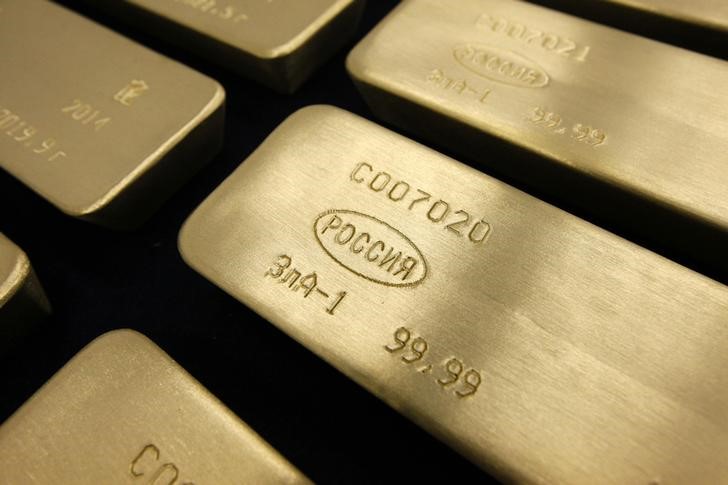
Gold prices advanced in Asian trade on Monday, remaining close to last week’s record highs as the prospect of more U.S. interest rate cuts after the Federal Reserve’s recent move buoyed the outlook for bullion.
Markets remained biased towards bullion before several more key U.S. economic readings this week, including the Fed’s preferred inflation gauge.
But gold was kept off record highs by some resilience in the dollar, which recovered from its weakest levels in over 3-½ years.
Spot gold rose 0.3% to $3,697.70 an ounce, while gold futures rose 0.7% to $3,733.10/oz by 01:33 ET (05:33 GMT). Spot prices hit a peak of $3,707.70/oz last week.
Gold keeps record highs close amid rate cut cheer
Gold’s recent record highs came as the Fed cut interest rates by 25 basis points last week in a widely telegraphed move.
The central bank cited increasing risks to the labor market as a motivator for the cut, and signaled that it will continue to lower rates in the coming months on more signs of labor weakness.
But the Fed still maintained its stance on potential inflationary risks, especially from higher trade tariffs. Markets, however, remained confident that interest rates will fall by at least 50 bps more this year, CME Fedwatch showed.
Lower rates bode well for non-yielding assets such as gold, given that they lower the opportunity cost of investing in the sector. Broader metal prices also advanced after the Fed’s cut.
Spot platinum rose 0.8% to $1,419.90/oz on Monday, while spot silver rose 1.3% to $43.6495/oz.
Among industrial metals, benchmark copper futures on the London Metal Exchange rose 0.1% to $10,001.10 a ton, while COMEX copper futures rose 0.1% to $4.6315 a pound.
US inflation, Fedspeak on tap this week
Focus this week is on a slew of key U.S. economic signals, which are likely to factor into near-term expectations for interest rate cuts.
Several Fed officials are set to speak this week, most notably Fed Chair Jerome Powell on Tuesday.
PCE price index data– the Fed’s preferred inflation gauge– is due on Friday, and is expected to show inflation remaining sticky in August. Core PCE inflation is also expected to remain above the Fed’s 2% annual target.
Other economic prints are also due this week, including preliminary purchasing managers index data for September, as well as a final reading on second-quarter gross domestic product growth.
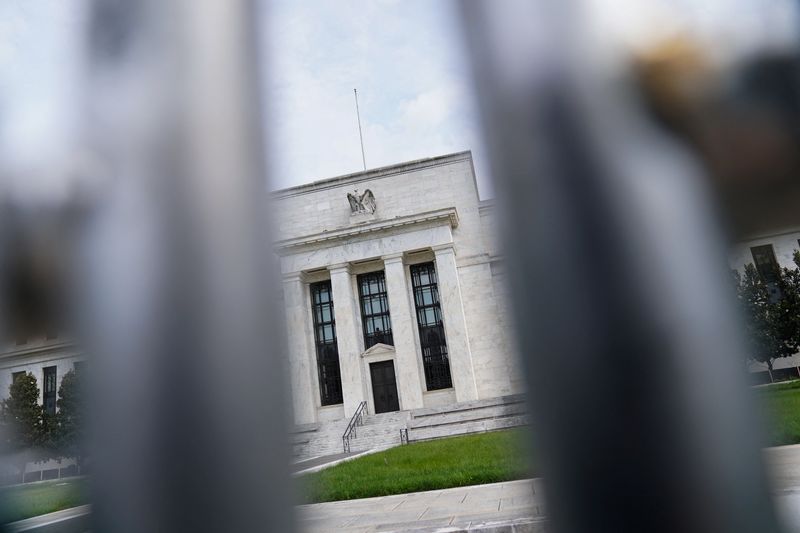
The Federal Reserve faces "no risk-free" choices as officials deliberate over the U.S. central bank’s future monetary policy decisions following an interest rate cut earlier this week, according to analysts at Morgan Stanley.
Along with helping maximize employment, the Fed is also tasked with pushing for price stability -- and the Morgan Stanley analysts led by Michael Gapen flagged that both the labor market and inflation are "moving in the wrong direction."
As a result, policymakers must try to use interest rates to strike a balance between supporting a softening jobs picture and corralling sticky inflationary pressures. In theory, cutting borrowing costs can encourage investment and hiring, albeit at the risk of driving up prices.
So far, the Fed has opted to prioritize employment, arguing that a recent tariff-driven uptick in inflation may prove to be temporary. The Fed slashed rates as expected on Wednesday, bringing down borrowing costs by a quarter point to a target range of 4% to 4.25%.
Fed Chair Jerome Powell described the reduction as a form of "risk management," signalling that weakening jobs data is playing heavily into officials’ thinking and have presented increased "downside risks to employment."
"The Fed seeks to mitigate downside risk to employment by taking its policy stance from restrictive to a more neutral setting," the Morgan Stanley analysts said, referring to a theoretical rate which neither boosts nor hinders growth.
They added that "more rate cuts are forthcoming." Crucially, the Fed’s announcement included fresh so-called "dot plot" policy projections which showed that officials are anticipating another half percentage point in rate cuts by the end of 2025.
Should these come to pass, it would leave borrowing costs at a range of 3.5% to 3.75% -- a decline from the level previously seen by the Fed when its last dot plot was released in June.
However, seven of the 19 estimates forecast fewer reductions this year, with one even calling for rates to have stayed at their prior band of 4.25% to 4.5% for the remainder of 2025. This means that debate could be fierce heading into the next Fed meetings in October and December.
Markets, for their part, are now placing a roughly 92% chance of a 25-basis point reduction in October, and about an 80% probability of a similarly-sized drawdown in December, according to CME’s FedWatch Tool.
Meanwhile, the Fed’s projections showed that most policymakers expect the economy to expand by 1.6% this year, above June’s forecast. The year-end jobless rate is seen at 4.5% and underlying inflation at 3.1%. Price gains are now not anticipated to slow to the Fed’s 2% target until 2028.
"In our baseline, prices rise and consumption slows into next year. It only reaccelerates beginning in the second quarter of 2026 after inflationary pressures begin to abate," the Morgan Stanley analysts said.
But they noted that if firms decide not to pass along much of their potential tariff-fueled input cost hikes on to customers, corporate margins may be compressed, presenting "downside risk to the labor market [...] through increased layoffs."
"Fed cuts could reduce this risk, but at the cost of higher inflation for longer, particularly if they amplify the effects of fiscal spending on demand," the analysts said, adding that policymakers are now stuck "between a rock and a hard place."
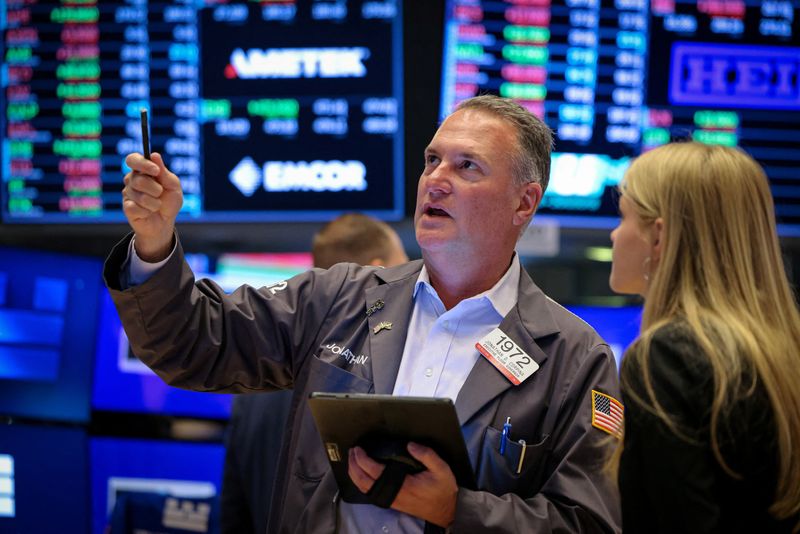
Advanced Micro Devices (NASDAQ:AMD) stock fell 5% Thursday morning after rivals Nvidia (NASDAQ:NVDA) and Intel (NASDAQ:INTC) announced a strategic collaboration to develop AI infrastructure and personal computing products together.
The partnership between AMD’s two major competitors sent ripples through the semiconductor sector, with Intel shares jumping 30% while AMD investors showed concern about potential market share challenges. The collaboration will focus on connecting Nvidia and Intel architectures using Nvidia’s NVLink technology, combining Nvidia’s AI expertise with Intel’s CPU technologies.
Under the agreement, Intel will build custom x86 CPUs for Nvidia’s AI infrastructure platforms. For the personal computing market, Intel will develop x86 system-on-chips that integrate Nvidia RTX GPU chiplets, creating products that directly compete with AMD’s offerings in both the data center and consumer segments.
Nvidia also announced a $5 billion investment in Intel common stock at $23.28 per share, further cementing the partnership between the two tech giants.
The collaboration poses a significant competitive challenge to AMD, which has been gaining ground in both the CPU and GPU markets. AMD has positioned itself as a strong competitor to both Intel in CPUs and Nvidia in GPUs, particularly in AI applications. This new alliance between its two main rivals could potentially squeeze AMD’s market position in both segments.
The partnership announcement comes at a time when competition in AI computing infrastructure has intensified, with AMD working to strengthen its own position in the rapidly growing AI chip market.
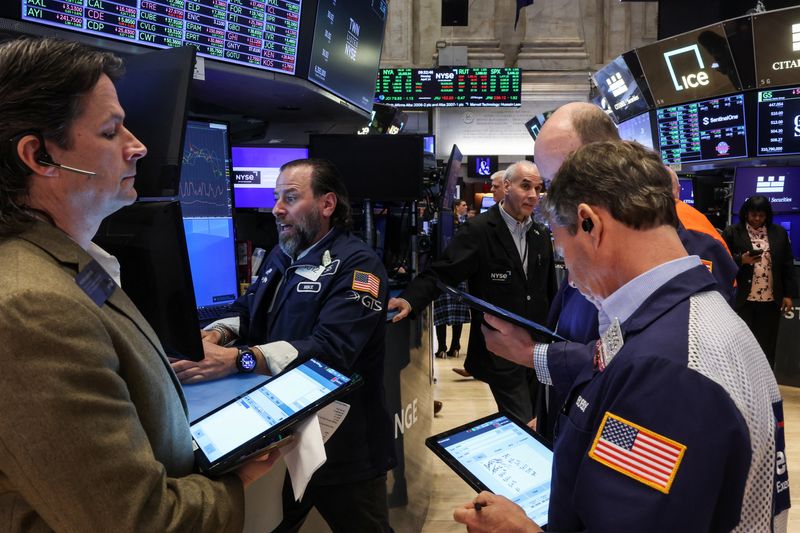
1. Futures subdued
U.S. stock futures hovered around the flatline on Wednesday, as investors prepared for the hotly-anticipated Federal Reserve interest rate decision.
By 03:30 ET (07:30 GMT), the Dow futures contract and S&P 500 and Nasdaq 100 futures were mostly unchanged, while Nasdaq 100 futures inched up by 19 points, or 0.1%.
The main averages on Wall Street sank in the prior session, while the U.S. dollar slipped to fresh 52-week lows — signs of caution ahead of the Fed’s impending announcement.
In individual stocks, Nvidia (NASDAQ:NVDA) shares declined on a news report which suggested that demand for the semiconductor giant’s new AI chip in China has been weak. On the other hand, Oracle’s (NYSE:ORCL) stock rose after the software group was rumored to be part of an investment consortium which, under a framework deal between the U.S. and China, will keep the U.S. arm of short-form video app TikTok in operation.
2. Fed decision day
The Fed is widely expected to slash interest rates at the conclusion of its latest two-day policy gathering, although the size of the possible drawdown and commentary around the move remain a source of debate.
Markets are all but certain the central bank will cut borrowing costs by at least 25 basis points from the current target range of 4.25% to 4.5%, while there is also a slim chance of a deeper, half-percentage point reduction.
Underpinning these estimates have been signs of a weakening U.S. labor market, which are seen overshadowing simultaneous indications of sticky inflation. In theory, a rate cut can help spur investment and hiring, albeit at the risk of driving up prices.
How the rate-setting Federal Open Market Committee, and, more specifically, Chair Jerome Powell, view the trajectory of the job market and inflation will be in sharp focus. Policymakers now face pressures to both sides of its dual mandate: maximizing employment while maintaining price stability.
Along with the more qualitative statements from the FOMC and Powell, the Fed will release an updated look at its members’ rate projections for the months ahead — a closely-monitored chart known as the “dot plot.”
“Inflation remains above target and tariffs are likely to keep it elevated in the near term, but the balance of risks are tilted towards the need for more support for the economy,” analysts at ING said in a note.
3. U.K. inflation stable in August
U.K. inflation held steady in August, but was almost twice the Bank of England’s target level, suggesting the U.K. central bank will keep monetary policy unchanged at its own policy meeting on Thursday.
Annual consumer price inflation rose 3.8% in August, unchanged from the July release, but still considerably above the Bank of England’s 2.0% medium-term target.
The July 2025 figure was the highest recorded since January 2024, when the rate was 4.0%.
The monthly rate rose 0.3%, rising faster than the 0.1% monthly growth seen in the prior month.
Core CPI, which excludes volatile energy and food prices, rose 0.3% on a monthly basis and 3.6% annually, a slight drop from the 3.8% growth seen in July.
4. General Mills to report
On the earnings front, General Mills is due to report before the opening bell on Wall Street.
Investors will be keeping tabs on how the packaged foods firm quarterly sales and expectations for future demand.
Concerns have swirled around whether consumers are reining in expenditures during a time of broader tariff-fueled economic uncertainty. A gauge of consumer sentiment last week from the University of Michigan ticked lower, with sweeping U.S. levies cited as a key driver of households’ fears over the state of their pocketbooks.
General Mills is anticipated to report fiscal first-quarter adjusted earnings per share of $0.82 on net sales of $4.52 billion, according to Bloomberg consensus estimates. Shares of the owner of brands like Chex breakfast cereal and Nature Valley granola bars have fallen by 22% so far this year.
5. Gold ticks lower
Gold prices edged down from record highs ahead of the release of the Fed’s rate decision and policy outlook.
Spot gold was last down 0.6% at $3,667.61 an ounce by 03:30 ET, after hitting an all-time peak of $3,702.95 on Tuesday. U.S. gold futures for December slipped 0.6% to $3,704.20/oz.
Meanwhile, oil prices slipped marginally lower, handing back some of the previous session’s gains on heightened concerns over disruptions in Russian production. The benchmarks settled more than 1% higher on Tuesday, climbing to two-week highs, due partially to worries that Russian supplies may be hit following Ukrainian drone attacks on critical export ports and refineries.
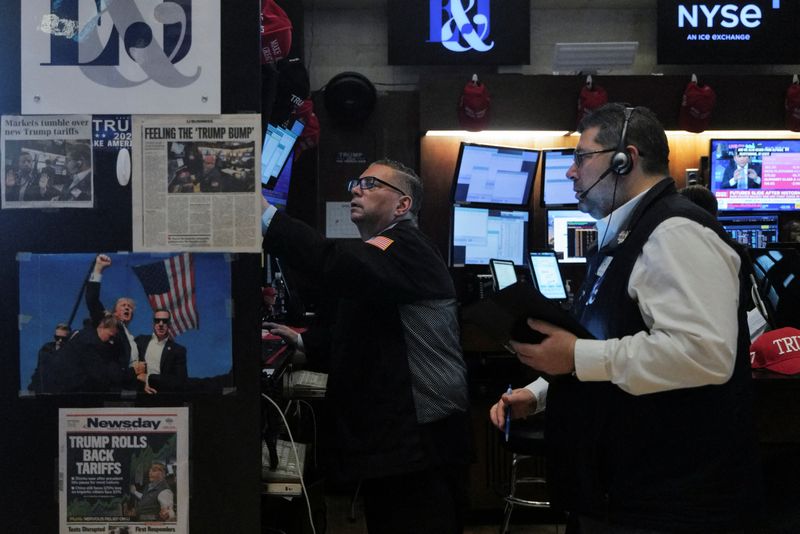
1. Futures edge broadly higher
U.S. stock futures pointed mostly higher on Tuesday, as investors geared up for the release of U.S. retail sales data and awaited a much-anticipated Federal Reserve interest rate decision later in the week.
By 03:13 ET (07:13 GMT), the Dow futures contract was mostly unchanged, while S&P futures ticked up by 6 points, or 0.1%, and Nasdaq 100 futures added 40 points, or 0.2%.
The main averages on Wall Street closed in the green on Monday, fueled in large part by hopes for a Fed rate cut.
Markets are all but certain that the U.S. central bank will slash borrowing costs by at least 25 basis points at the end of its latest policy gathering on Wednesday, while there is also an outside chance of a deeper half-point drawdown from the current target range of 4.25% to 4.5%. The rate-setting Federal Open Market Committee will begin its two-day meeting today.
Stocks were buoyed as well by electric carmaker Tesla (NASDAQ:TSLA), whose shares rallied by 3.6% on a regulatory filing showing that CEO Elon Musk had bought around $1 billion worth of the stock. Google-owner Alphabet (NASDAQ:GOOGL) also notched a fresh all-time peak that brought its market value above $3 trillion.
2. Retail sales ahead
Highlighting the economic calendar will be U.S. retail sales data for August, which is expected to show that growth in the figure slowed.
Economists estimate that, on a month-on-month basis, retail sales rose by 0.2% last month, compared to an uptick of 0.5% in July.
Concerns remain that indications of a softening U.S. labor market in recent months could weigh on spending activity, while a gauge of consumer sentiment from the University of Michigan for September weakened to its lowest point since May as households fretted over the risk of a tariff-driven spike in inflation that could eat into their purchasing power.
Along with "multiple vulnerabilities" in the economy, "consumers perceive risks to their pocketbooks as well," with current and expected personal finances both easing about 8% this month, said Joanne Hsu, the director of the Surveys of Consumers at the University of Michigan, in a statement.
3. Appeals court rejects Trump bid to oust Fed Governor Cook
President Trump cannot fire Fed Governor Lisa Cook, an appeals court ruled on Monday, allowing her to remain on the central bank’s board for the closely-watched policy meeting this week.
The U.S. Court of Appeals for the District of Columbia Circuit in a 2-1 ruling denied the Department of Justice’s request to put on hold an earlier decision blocking Trump from removing Cook.
U.S. District Judge Jia Cobb last week ruled that Trump’s allegations of mortgage fraud against Cook, which the Fed governor denied, did not provide sufficient cause for her firing. Trump is now expected to appeal the case in the Supreme Court.
Separately, Trump’s nomination to the Fed Board of Governors, economist Stephen Miran, was approved by the Senate in a narrow vote on Monday evening. The confirmation allows Miran to participate in the Fed’s meeting this week.
4. Oracle poised for key role in TikTok U.S. deal - CBS News
Oracle (NYSE:ORCL) is among a consortium of firms that could enable TikTok to continue operating in the U.S. if a framework deal between Washington and China is reached, CBS News reported on Monday.
The precise nature of the deal was unclear, but will involve multiple companies, CBS reported, citing sources with knowledge of the negotiations. The involvement of China’s ByteDance, which owns TikTok, was also not immediately known.
The report comes after U.S. officials said they had agreed to commercial terms of the deal with Beijing, following high-level talks in Madrid between the two countries.
Trump hinted earlier this week that a deal was on the way, posting on social media that an agreement was "reached on a ‘certain’ company that young people in our country very much want to save.”
5. Gold new record high
Gold touched a new all-time peak, nearing $3,700 per ounce, bolstered by a weaker U.S. dollar prior to the Fed decision.
By 03:34 ET, spot gold had jumped by 0.3% to $3,690.87 per ounce. U.S. gold futures for December moved up by 0.2% to $3,726.50/oz.
Bullion jumped 1% in the previous session, surpassing record levels notched last week.
Elsewhere, crude prices inched lower, pausing for breath after recent gains as markets assessed the upcoming Fed announcment and Ukrainian attacks on Russian oil facilities.
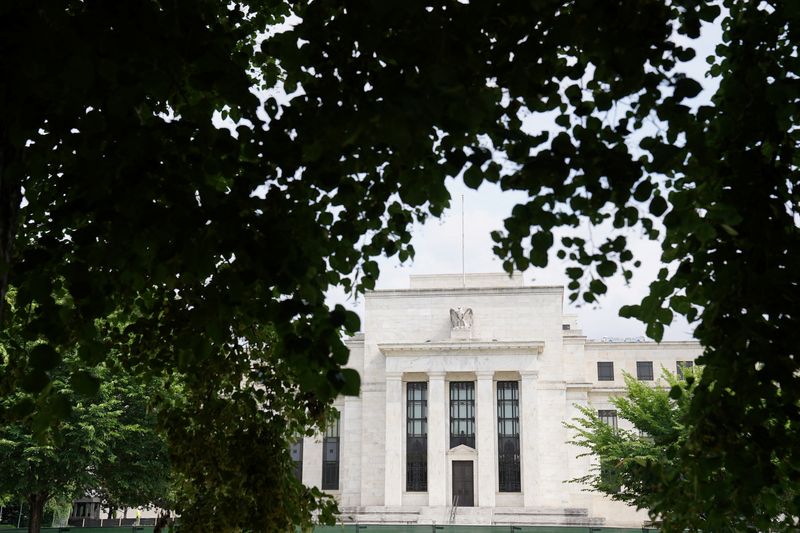
1. Fed decision in focus
The Fed will be in the spotlight this week, as markets are now all but certain that the central bank will slash interest rates at the end of its two-day gathering on Wednesday.
Underpinned by signs of a softening U.S. labor market, policymakers are widely anticipated to back the first rate cut since an easing cycle was paused in December. Bringing down rates can, in theory, help spur investment and hiring.
However, a reduction can risk pushing up inflationary pressures at the same time. Last week, a monthly U.S. consumer price index reading accelerated slightly thanks to an uptick in housing and food costs, a potential indication of sticky inflation.
Yet a separate measure showing a rise in weekly initial jobless claims likely kept a Fed rate cut on track. There is now a roughly 95% probability that borrowing costs are lowered by 25 basis points, as well as about a 5% chance of a deeper half-point drawdown, according to CME’s FedWatch Tool. The Fed’s target rate currently stands at a range of 4.25% to 4.5%.
"Inflation remains above target and tariffs are likely to keep it elevated in the near term, but the balance of risks are tilted towards the need for more support for the economy," analysts at ING said in a note.
2. Bank of Canada, Bank of England, Bank of Japan decisions ahead
Along with the Fed, interest rate decisions are due out from a slate of other central banks around the world.
The Bank of Canada is seen slashing rates by a quarter-point, in a bid to offer support to an economy that is especially exposed to U.S. President Donald Trump’s sweeping tariffs. The Canadian job market slowed for a second straight month in August, while the wider economy contracted sharply in the second quarter, although inflation has not strayed far from analysts’ expectations.
At the Bank of England, officials are anticipated to leave borrowing costs unchanged. The BoE, which will also have the chance to gauge jobs and inflation data prior to Thursday’s decision, previously slashed rates in August.
Analysts also project that the Bank of Japan will keep rates steady, although investors may be keeping an eye out for any hints around the policymakers’ plans for the fourth quarter against a backdrop of wider domestic political uncertainty.
3. U.S. retail sales
On the economic calendar, U.S. retail sales data for August is set to be released on Tuesday.
Economists are predicted that retail sales growth decelerated to 0.2% last month. In July, the figure came in at 0.5%, bolstered by solid demand for cars and promotional drives by e-commerce giant Amazon.com and big-box titan Walmart.
June’s sales numbers were revised higher as well, providing some hope that economic activity has been able to weather the wider labor market slowdown.
Still, the prospect of an easing jobs picture, coupled with indications of fading consumer confidence and heightened goods prices, are possible headwinds for sales heading into the final weeks of the third quarter.
4. FedEx to report
FedEx will be among the headliners on this week’s earnings agenda, with the U.S. shipping group viewed as a proxy for consumer spending.
Considered an economic bellwether because it has ties with just about every type of company around the world, FedEx’s numbers have often been closely monitored for indications of early business trends.
Trump’s aggressive trade policies have been in sharp focus in FedEx’s recent quarterly results, as the White House’s tariffs have contributed to wider economic uncertainty that has led many firms to rein in spending.
In June, FedEx offered a cautious outlook that was fueled by the levies. The company declined to unveil a full-year earnings or revenue outlook, with CEO Raj Subramaniam warning of a "volatile" global demand environment.
Memphis-based FedEx’s fiscal first-quarter forecast of adjusted profit per share of $3.40 to $4 fell short of analysts’ expectations as well.
5. U.S.-China talks
U.S. and China officials are set to meet again after reportedly made little progress in the first day of a fresh round discussions on Sunday.
Anticipation for the talks in Madrid has been subdued, particularly around a breakthrough on longstanding trade tensions between the world’s two largest economies.
Observers are instead expecting the negotiations to conclude with an extension to a deadline for short-form video app TikTok -- which is owned by China’s ByteDance -- to divest its U.S. operations. At the moment, if ByteDance does not sell the unit by September 17, TikTok faces a shutdown in the U.S.
Citing a source familiar with the matter, Reuters reported that President Donald Trump is likely to extend the deadline.
Bessent told reporters that both sides would "start again in the morning" after they met for just six hours on Sunday. Meanwhile, China’s embassy in Madrid informed reporters that a concluding news conference could take place on Monday, suggesting that the talks could wrap up soon. Bessent is set to head to London on Tuesday, prior to Trump’s state visit with King Charles later in the week.
Elsewhere, before the start of the negotiations in Spain, China’s Ministry of Commerce opened an anti-discrimination probe into U.S. policy over the trade of chips and a separate investigation into suspected dumping of U.S. analog chips.
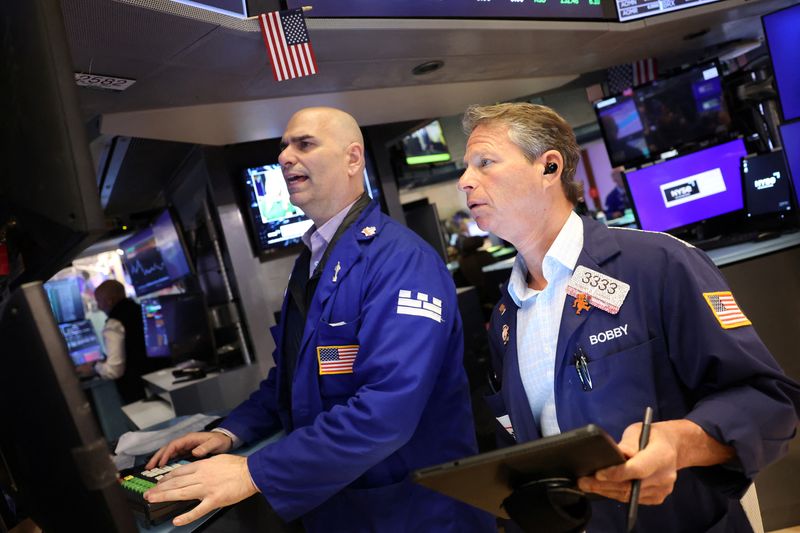
1. Futures muted
U.S. stock futures were subdued on Friday, after Wall Street’s main averages logged steep gains in the prior session on economic data which cemented expectations for a Federal Reserve interest rate cut next week.
By 03:34 ET (07:34 GMT), the S&P 500 had slipped by 3 points, or 0.1%, Nasdaq 100 futures were mostly unchanged and Dow futures had dipped by 32 points, or 0.1%.
On Thursday, the blue-chip Dow Jones Industrial Average notched a record-high close. The benchmark S&P 500 and tech-heavy Nasdaq Composite also rose by 0.85% and 0.72%, respectively, touching all-time peaks as well.
Underpinning sentiment were figures showing that U.S. consumer price growth accelerated in August, albeit roughly in line with expectations, while weekly initial jobless claims ticked up to nearly a four-year high. The numbers reinforced bets that the Fed would slash rates at its September 16-17, with officials seen prioritizing an easing labor market over sticky inflation.
Markets are now all but certain the Fed will reduce borrowing costs from their current range of 4.25% to 4.5% by at least 25 basis points, according to CME’s FedWatch Tool. There is around a 7% chance the central bank will opt for a deeper, half-point drawdown.
Along with the data, the indices were buoyed by a surge in shares in electric carmaking giant Tesla. Micron Technology also advanced by 7.5% following a move by Citigroup to lift its price target of the memory chip manufacturer.
2. Adobe raises outlook
Adobe raised its annual financial forecasts, citing solid demand for its artificial intelligence-enhanced design software tools.
Shares in the maker of popular editing platforms like Photoshop and Premiere Pro increased by a little over 3% in extended hours trading.
Still, the stock has slipped by more than 20% so far this year, as investors fret over Adobe’s ability to show returns from its heavy investments in AI. Grappling with intensifying competition from smaller peers like Figma, Adobe has rolled out Firefly, which harnesses AI to help users craft videos and images from text prompts.
Analysts remain worried that Firefly may not spur widespread adoption of Adobe’s offerings, although CFO Dan Durn told Reuters that new users and subscribers have been the predominant drivers of growth.
Adobe said it now expects fiscal 2025 revenue to between $23.65 billion and $23.70 billion, compared to $23.50 billion to $23.60 billion previously. Full-year adjusted per-share profit is tipped to come in at $20.80 to $20.85, versus a prior outlook of $20.50 to $20.70.
3. Michigan consumer sentiment survey ahead
Investors will have the chance to pour through more economic indicators on Friday, with the headliner set to be a gauge of consumer sentiment from the University of Michigan.
Economists anticipate that the survey for September will match the prior month. In August, the measure slipped to 58.2, as households remained concerned by the potential impact of sweeping U.S. tariffs on prices.
Consumers’ 12-month inflation expectations ticked up to 4.8%, which would be well above the 2% target level pursued by the Fed. Long-run expectations came in at 3.5%. Analysts at ING said they would be "keeping a close eye" on these numbers.
On Thursday, figures from the Bureau of Labor Statistics showed that the consumer price index was 2.9% in the 12 months to August, compared to 2.7% in July and matching economists’ expectations. Month-on-month, the inflation gauge stood at 0.4%, faster than 0.2% in the prior month and slightly above forecasts of 0.3%.
4. Microsoft, OpenAI reach non-binding deal over OpenAI restructuring
Microsoft (NASDAQ:MSFT) and OpenAI said on Thursday evening that they had reached a non-binding agreement over the AI start-up’s plans to transition to a for-profit organization.
Shares of Microsoft were higher in after-market trade following the announcement.
No specific terms of the arrangement were released by the firms, who in a joint statement said the agreement was for the “next phase” of their partnership. The two said they are “actively working to finalize contractual terms in a definitive agreement.”
OpenAI said the company’s non-profit entity will receive over $100 billion -- or around a fifth of the $500 billion valuation it is seeking in public markets -- "making it one of the most well-resourced philanthropic organizations in the world."
Faced with burgeoning revenue and a need to secure greater computing capacity to meet soaring demand, OpenAI has been looking to adopt a more conventional corporate structure and lock in partnerships with a wider variety of cloud providers. Microsoft, which previously had exclusive rights to sell OpenAI’s tools, has softened its hold in recent months, allowing OpenAI to go after a massive data center project.
5. Oil falls
Oil prices dipped, adding to the previous session’s sharp losses on fears around oversupply as well as a possible weakening in U.S. demand.
At 03:34 ET, Brent futures dropped 0.7% to $65.91 a barrel, and U.S. West Texas Intermediate crude futures fell 0.7% to $61.92 a barrel.
Oil fell nearly 2% on Thursday, but the crude benchmarks are still on course for weekly gains after strength at the start of the week on the potential for disruptions to output or trade flows from conflict and war.
An Energy Information Administration report on Wednesday said U.S. crude stocks rose last week by 3.9 million barrels to 424.6 million barrels, suggesting demand in the largest energy consumer in the world is set to slow as the year progresses.
Additionally, the International Energy Agency said in its monthly report world oil supply would rise more rapidly than expected this year due to planned output increases by the Organization of the Petroleum Exporting Countries and allies like Russia, a group known as OPEC+.
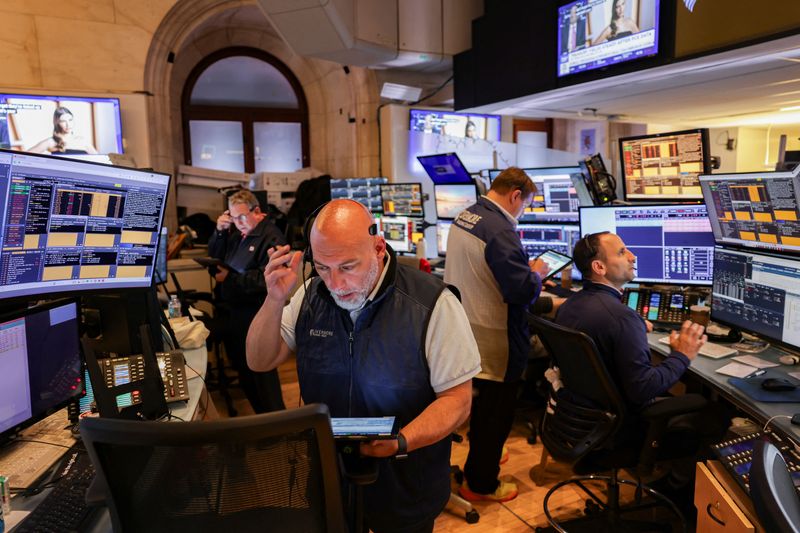
1. Futures higher
U.S. stock futures pointed higher on Thursday as investors geared up for the release of key consumer price data that could impact the trajectory of Federal Reserve interest rate policy.
By 03:10 ET (07:10 GMT), the Dow futures contract had risen by 35 points, or 0.1%, S&P 500 futures had climbed by 8 points, or 0.1%, and Nasdaq 100 futures had ticked up by 39 points, or 0.2%.
The main averages on Wall Street ended in mixed fashion on Wednesday, with traders gauging a blowout earnings report from artificial intelligence-enhanced cloud software group Oracle and an unexpected fall in producer prices in August which bolstered bets for an imminent Fed rate cut.
Both the benchmark S&P 500 and tech-heavy Nasdaq Composite indices closed at all-time peaks, powered in large part by a surge in Oracle’s shares. The stock spiked by 36% -- its largest one-day gain since 1992 and giving it a market capitalization not far from the $1 trillion mark. The blue-chip Dow Jones Industrial Average, meanwhile, dropped by 0.48%.
2. CPI ahead
Attention is turning to the consumer price index for August, a crucial gauge of inflationary pressures.
The data from the Labor Department’s Bureau of Labor Statistics is anticipated to show that prices grew at an annualized rate of 2.9% in August, accelerating slightly from 2.7% in July.
At that level, the Fed would likely be facing simultaneous threats to both sides of its dual mandate -- maximizing employment and maintaining price stability, defined as a long-run inflation rate of 2%.
This would leave policymakers with the knotty task of simultaneously addressing a cooling labor market and sticky prices, an economic situation that could threaten to edge into a period of "stagflation" marked by high inflation, tepid growth and elevated unemployment.
However, a separate report on Wednesday showed a surprise decline in U.S. factory-gate prices in August. Analysts highlighted that prices in tariff-exposed categories in particular were relatively muted.
So far, Fed officials, including Chair Jerome Powell, have indicated that they are likely to prioritize the labor market’s easing over inflation. A rate cut could in theory spur more investment and hiring, albeit at the risk of fueling price growth.
3. ECB decision
Prior to the Fed’s decision at its September 16-17 gathering, the European Central Bank is scheduled to unveil its own rate announcement on Thursday.
The ECB is widely anticipated to leave borrowing costs unchanged. However, analysts at ING noted that the debate between supporters of keeping rates steady and those in favor of a cut "will likely be more heated than markets have priced in."
Perceived hawkish commentary from ECB President Christine Lagarde in July has weighed on expectations for impending rate moves, with the central bank eyeing slightly higher-than-anticipated inflationary pressures since its last gathering and faster-than-expected economic growth.
These developments, along with ongoing uncertainty over U.S. tariffs, have fueled bets that the ECB will provide little clear guidance around its own policy trajectory -- and will back keeping its key deposit rate unaltered at 2% for a second straight meeting.
4. Adobe to report
Headlining the earnings calendar will be software tools provider Adobe, who will report its quarterly returns after the closing bell.
Sentiment around the firm behind the Photoshop image editor and Acrobat Pro file manager is negative, with many investors flagging that Adobe faces "significant cyclical and secular headwinds," analysts at Vital Knowledge said in a note.
The company is seen posting fiscal third-quarter earnings per share of $5.18 on sales of $5.91 billion, Bloomberg consensus estimates showed.
In June, San Jose-based Adobe raised its annual financial guidance, but observers fretted over when the business could begin to see results from its adoption of AI.
5. Oil inches down
Oil prices slipped lower on weak demand in the United States, after logging strong gains this week on heightened geopolitical tensions in Russia and the Middle East.
At 03:36 ET, Brent futures dropped 0.1% to $67.40 a barrel, and U.S. West Texas Intermediate crude futures fell 0.2% to $63.56 a barrel.
U.S. crude inventories rose by 3.9 million barrels in the week to September 5, the Energy Information Administration said late Wednesday, against expectations of a draw of 1 million barrels.
Gasoline stocks also rose, adding 1.5 million barrels, against expectations of a draw of 200,000 barrels.
Evidence of a slowing U.S. economy will raise concerns that demand in the largest energy consumer in the world is set to slow as the year progresses.
Elsewhere, gold prices edged down amid investor caution prior to the U.S. consumer price report, but the yellow metal stayed close to record highs on firm expectations that the Fed will cut interest rates next week.
Bullion is particularly sensitive to borrowing costs, as lower rates reduce the opportunity cost of holding the non-yielding asset.

The Federal Reserve is set to embark on a steady easing cycle, delivering five rate cuts through mid-2026, according to Wells Fargo analysts.
In a note on Wednesday, the bank projected that the Fed “cut the federal funds rate by 25 bps at each of its next three meetings, pushing the target range down to 3.50%-3.75% by year-end.” Two further quarter-point cuts are expected at the March and June meetings next year, which would bring the terminal rate to 3.00%-3.25%.
The softer outlook is driven largely by a weakening labor market. “The U.S. labor market is in a precarious position, in our view, and this is the primary driver of our more dovish monetary policy outlook,” Wells Fargo wrote.
The analysts pointed to a “measly 29K” three-month average in nonfarm payroll growth in August and a fresh cycle-high unemployment rate of 4.3%.
Inflation, however, remains a constraint. The note highlighted that “the core PCE deflator is up 2.9% year-over-year” and that prices for physical goods are keeping inflation “stubbornly above the central bank’s 2% target.”
Still, Wells Fargo stressed that inflation expectations “generally have been well-behaved of late.”
The bank warned that recession risks have “ticked higher,” assigning a 35% probability of a U.S. downturn in the next 12 months.
But beyond 2025, Wells Fargo struck a more optimistic tone, forecasting “an above-consensus 2.4% Q4/Q4 growth rate for real GDP next year” as fiscal stimulus and the lagged effects of rate cuts filter through.
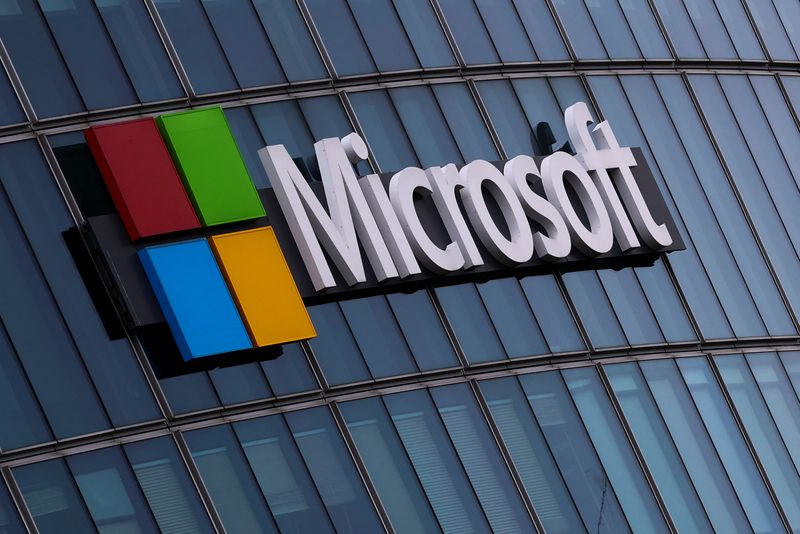
The Amsterdam-based firm, which supplies Nvidia (NASDAQ:NVDA) graphics processors for artificial intelligence training, said it will provide computing resources to Microsoft from a New Jersey data center.
Nebius rebranded from Yandex NV last year after Yandex’s Russian-language operations were sold to a group of local investors.
Microsoft has been turning to outside providers to ease a shortage of AI-ready cloud infrastructure. OpenAI, one of Microsoft’s largest Azure customers, has been seeking additional computing capacity, recently striking a deal with Google.
The Windows maker has also tapped CoreWeave Inc (NASDAQ:CRWV), which separately signed a multibillion-dollar supply agreement with OpenAI.
CoreWeave’s stock gained about 6% in the premarket trade.
Earlier this year, Reuters reported that CoreWeave has secured a role in Google’s new partnership with OpenAI.
The cloud provider, which builds services on Nvidia GPUs, will supply capacity to Google Cloud, which in turn will resell it to OpenAI to support products like ChatGPT, the report said. Google will also contribute some of its own resources directly to OpenAI.
Nebius said it may pursue new financing to accelerate expansion beyond its original plans. In a filing with the SEC, the company disclosed that GPU services will be rolled out in stages this year and next.
The contract is valued at $17.4 billion through 2031, with Microsoft retaining the option to purchase an additional $2 billion of services.
Before Tuesday’s premarket surge, Nebius shares had already more than doubled in 2025, ending the Monday session with a market value just above $15 billion.

